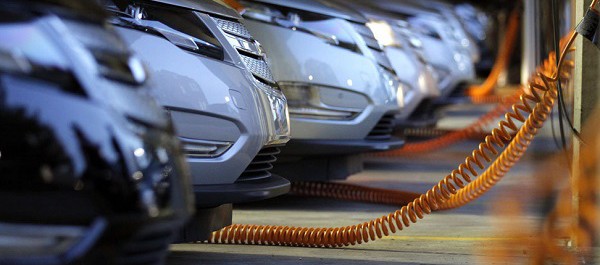A proper choice of business model plays a critical role in electric vehicle industry where many consumers are subject to range and resale anxieties.
In particular, a combination of owning or leasing electric batteries and improving charging technology can reassure such skeptics and help increase the electric vehicle adoption, according to a new study in the Articles in Advance section of Manufacturing and Service Operations Management (M&SOM), a publication of the Institute for Operations Research and the Management Sciences (INFORMS).
The study, Toward Mass Adoption of Electric Vehicles: Impact of the Range and Resale Anxieties, is by Michael K. Lim of the University of Illinois at Urbana-Champaign, Ho-Yin Mak of Hong Kong University of Science and Technology, and Ying Rong of Shanghai Jiao Tong University.
According to the authors, two psychological barriers are holding back an increase in electric vehicle purchases: (1) range anxiety, the concern that the driving range of electric vehicles (typically 80 miles given current battery capacity) won’t be enough to meet a driver’s needs; and (2) resale anxiety, the concern that the price of used electric vehicles will not hold strong in the future, making it hard for them to resell their cars.
To understand the impact of consumer anxieties, the authors used a two-stage game-theoretic modeling framework. The first stage examines the introduction phase, in which only new electric vehicles are available. At this stage, consumers have little experience with the product and exhibit both types of anxieties. The second stage is the maturity phase, in which both new and used electric vehicles are available in the market. At this stage, the authors consider anxieties to diminish as consumers learn more about the electric vehicles and the market. Calibrating the model to the San Francisco Bay area freeway network, auto market figures, and industry reports, the authors examined several business options to determine which would reassure consumers while also yielding desired profits.
In contrast to the common current American model for electric vehicles, in which consumers own the vehicle with battery and recharge it at home overnight, two models offer promising alternatives, the authors write.
1. The first model represents the case in which battery enhanced charging service is made available through additional support infrastructure. This includes, for example, Tesla’s supercharger stations and other quick charging stations that are being introduced in the U.S. by firms such as Chargepoint and NRG eVgo.
2. In the second model, consumers lease the batteries and are also offered enhanced battery charging services. One example is a business model that offers enhanced charging in the form of battery swapping coupled with the battery leasing service. In a second example, Renault is selling its ZOE in Europe with battery leasing and the support of quick charging infrastructure.
The authors’ key findings are:
– Despite the qualitative similarity between the two anxieties, their impacts on electric vehicle adoption can be quite different. While range anxiety typically hurts adoption, resale anxiety can actually help adoption (depending on the EV production cost level).
– Further, interestingly, anxieties do not necessarily harm consumers; in fact, they typically benefit consumers since the presence of anxieties forces the firm to cut vehicle prices and invest more in public charging infrastructure.
– The battery leasing service improves the firm’s profit at the expense of total adoption and consumer surplus, when not offered with the public charging option.
– Most importantly, increasing the driving range of electric vehicle through public charging infrastructure typically yields more socially desirable adoption outcomes (greater adoption and emission savings) than increasing the battery capacity.
Overall, under many instances, the authors find that the first model provides the highest benefit (electric vehicle adoption, emission savings, profitability, and consumer surplus) unless resale anxiety is high. When the level of resale anxiety is relatively high, the second model typically offers a more desirable outcome.
“Therefore,” the authors advise, “policy makers must take into account these factors in implementing governmental policies to properly incentivize the involved parties, especially the private sector.”
References:
Publication: Michael K. Lim, Ho-Yin Mak, Ying Rong. Toward Mass Adoption of Electric Vehicles: Impact of the Range and Resale Anxieties. Manufacturing & Service Operations Management, 2015
Story Source: Key to Reassuring Electric Vehicle Buyers: Combine Battery Owning/Leasing with Enhanced Charging Services, Says INFORMS Journal Study, Institute for Operations Research and the Management Sciences — January 28, 2015












Comments